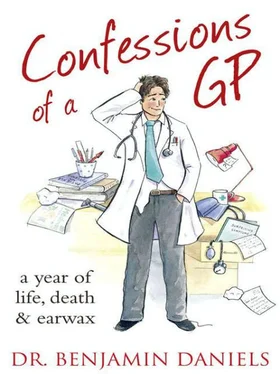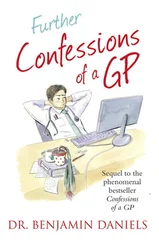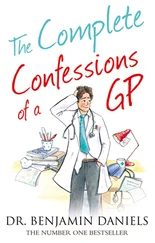In one surgery I worked in, 1 in 10 of the adult patients was on antidepressants. That seems a huge number to me! I’m not sure if we were overprescribing them, or if our patients were a particularly miserable lot. I am certainly no expert in this subject, but depression is something that I see a huge amount of in general practice. The vast majority of cases are dealt with by us rather than psychiatrists and most GPs have had to become skilled in recognising the symptoms of depression and offering support.
Depression used to be a subjective diagnosis based on the outlook of the doctor and the patient. The powers that be seem to find this a difficult concept so have found ways for us to measure depression. This allows us to fit the depressed patient into a neat box and follow a set protocol. The result is that we can then be measured and shown to be either achieving or failing to reach targets. I find this very irritating. Many people with depression don’t ever seek help. It takes a lot for a person to find the courage to come and see a doctor and tell him or her about some very difficult thoughts and feelings that they may be experiencing. It is a very personal consultation and usually requires the doctor to mostly listen and occasionally ask a few questions that may help illicit a few of the more subtle issues and personal aspects of the illness.
I like to think that after having worked in psychiatry and now having been a GP for some time, I’m quite skilled in this area. Unfortunately, in order to reach targets and hence earn points and money, I now have to interrupt a potentially very sensitive and important consultation to fill in a questionnaire. The answers give me a number by which the computer can categorise the person’s feelings and decide whether they need an antidepressant or not. I find this slightly demeaning to both me and the patient.
My other big issue with the way GPs treat depression is the automatic reflex we seem to have for giving out antidepressants. I am certainly not against antidepressants and feel that for many people they play a valuable role in helping improve lives, but are we overprescribing them? For me, there seem to be three common presentations of depression that we see day in and day out in general practice. The symptoms can be quite similar, but I feel that the underlying cause can be very different and that this is fundamental to how we treat it.\
Type 1. Grieving
You don’t have to be a doctor to know that if something bad happens to us we feel sad. A bereavement or a relationship breakdown can give us all symptoms of depression. Feeling tearful, poor appetite and problems sleeping are all classic examples. Using my questionnaire, these symptoms would flag up a diagnosis of depression and suggest antidepressants, but is this really the right diagnosis? Isn’t a grief reaction a normal part of being a human? I’m not saying that these patients shouldn’t come to see their GP. We can offer support and a sympathetic ear. Maybe we could even refer them for counselling, but in the majority of cases, time and support from family and friends are enough to get people through these difficult times. Isn’t it okay to feel sad sometimes?
Type 2. Classic clinical depression
These people often spend much of their lives moving in and out of long bouts of depression. The condition severely disables the sufferer and those close to them and is a diagnosable ‘illness’. Often there is a strong family history of the disease and although there may be triggers for depressive bouts, sometimes there is no obvious cause and from the outside the sufferer has absolutely nothing to be depressed about. There is a risk of suicide and these people often do benefit from medication. The antidepressants alter the way in which certain neurotransmitters work in the brain and, sometimes along with other types of support, can help people turn the corner and begin to feel better.
Type 3. Low-grade misery
This is probably what I see most of when working in an inner city. I spoke earlier in this book about SLS – shit life syndrome. This is the theory that people are suffering from symptoms of depression but rather than an imbalance in certain brain chemicals, they are simply living a really hard and often shitty life. This may seem like a harsh derogatory generalisation, but I defy anyone who works with single mums on the council estates of this country to deny that SLS exists. Yet again, my computer’s questionnaire labels these patients as depressed, but I generally find antidepressants fairly ineffective in these cases. For example, I saw a young single mum who had been feeling miserable for years. She wanted to try yet another happy pill and was demanding to know why none of the previous antidepressants had worked. Rather than just sign another prescription, I decided to try a new approach. We went through all the reasons that she felt miserable. These included being abused as a child, never knowing her father and having a difficult relationship with her mother. She had had abusive relationships with several men as an adult and and as a result was now alone with three children. She was unhappy with her appearance, had no confidence in herself and was struggling financially. She lived in a small, damp council flat in a particularly rough estate with lots of crime. Reflecting on all the shit things in her life didn’t exactly lift her mood but then we made a list of positive things for her to attempt. She is now doing a college course and claiming for child support from her children’s fathers. A small step, but more mood lifting than a little white pill.
People feel low for all sorts of reasons and whatever they are they should still come and see their GP for support. The point I’m trying to make is that one size doesn’t fit all. Maybe we should try harder to look for alternative ways of helping people rather than always simply trying to make all the bad stuff disappear with a happy pill. Some people benefit from counselling or other forms of talking therapy, although, unfortunately, these are generally very oversubscribed and underresourced. Some people don’t actually want counselling or antidepressants but simply feel a bit better by coming to see me and telling me that they are feeling a bit sad. It can feel odd as a doctor not to then prescribe something or make a referral. It feels like I’m not doing anything at all but I’ve learnt not to underestimate the healing power of simply listening.
Top 1 per cent of the population
These are apparently genuine excerpts from medical school entrance exams.
1. Three kinds of blood vessels are arteries, vanes and cater-pillers.
2. Blood flows down one leg and up the other.
3. The hookworm larvae enters the human body through the soul.
4. For fainting: rub the person’s chest or, if a lady, rub her arm above the hand instead.
5. For fractures: to see if the limb is broken, wiggle it back and forth.
6. For dog bite: put the dog away for several days. If he has not recovered, then kill it.
7. For nosebleed: put the nose much lower than the body.
8. For drowning: climb on top of the person and move up and down to make artificial perspiration.
9. To remove dust from the eye, pull the eye down over the nose.
10. For head colds: use an agoniser to spray the nose until it drops in your throat.
11. For snakebites: bleed the wound and rape the victim in a blanket for shock.
12. For asphyxiation: apply artificial respiration until the patient is dead.
13. Before giving a blood transfusion, find out if the blood is affirmative or negative.
14. If the lady is sexually activated, you must do a pregnancy test.
Читать дальше
Конец ознакомительного отрывка
Купить книгу











![Benjamin Franklin - Memoirs of Benjamin Franklin; Written by Himself. [Vol. 2 of 2]](/books/747975/benjamin-franklin-memoirs-of-benjamin-franklin-wr-thumb.webp)
![Benjamin Franklin - Memoirs of Benjamin Franklin; Written by Himself. [Vol. 1 of 2]](/books/748053/benjamin-franklin-memoirs-of-benjamin-franklin-wr-thumb.webp)